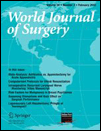Antibiotic Therapy Versus Appendectomy for Acute Appendicitis: A Meta-Analysis
This article was presented at the Annual Conference of the Society for Academic and Research Surgery, London, January 2010.
Abstract
Background
Antibiotic treatment has been shown to be effective in treating selected patients with acute appendicitis, and three randomized controlled trials (RCTs) have compared the efficacy of antibiotic therapy alone with that of surgery for acute appendicitis. The purpose of this meta-analysis of RCTs was to assess the outcomes with these two therapeutic modalities.
Methods
All RCTs comparing antibiotic therapy alone with surgery in patients over 18 years of age with suspected acute appendicitis were included. Patients with suspected perforated appendix or peritonitis, and those with an allergy to antibiotics had been excluded in the RCTs. The outcome measures studied were complications, length of hospital stay, and readmissions.
Results
Meta-analysis of RCTs of antibiotic therapy versus surgery showed a trend toward a reduced risk of complications in the antibiotic-treated group [RR (95%CI): 0.43 (0.16, 1.18) p = 0.10], without prolonging the length of hospital stay [mean difference (inverse variance, random, 95% CI): 0.11 (−0.22, 0.43) p = 0.53]. Of the 350 patients randomized to the antibiotic group, 238 (68%) were treated successfully with antibiotics alone and 38 (15%) were readmitted. The remaining 112 (32%) patients randomized to antibiotic therapy crossed over to surgery for a variety of reasons. At 1 year, 200 patients in the antibiotic group remained asymptomatic.
Conclusions
This meta-analysis suggests that although antibiotics may be used as primary treatment for selected patients with suspected uncomplicated appendicitis, this is unlikely to supersede appendectomy at present. Selection bias and crossover to surgery in the RCTs suggest that appendectomy is still the gold standard therapy for acute appendicitis.




